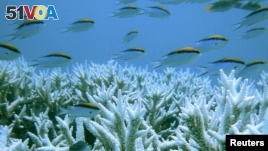12 December, 2014
American scientists are warning of a threat to the world's coral and rocky reefs. The National Oceanic and Atmospheric Administration has identified four reasons for the threat. They are human population growth, the warming of Earth's atmosphere, pollution and overfishing – catching too many fish.
The state of California has one of the best habitats for sea life in the world. But the same four factors are endangering California's rocky reefs and kelp forests.
Erica Fellins is with Reef Check -- an international non-profit group.

Corals and fish are seen at Australia's Great Barrier Reef in this 2002 file photo. (Centre for Marine Studies, The University of Queensland/Ove Hoegh-Guldberg)
"I've seen the kelp go from really thick to really, really thin. But is important to monitor it.
Erica Fellins and hundreds of other volunteer divers are trained to examine the health of kelp forests and coral and rocky reefs around California. This past summer, her group documented a 25-percent decrease in more than 20 different fish populations since 1970.
Reef Check is part of a growing "citizen science" movement in the United States. Stephen Campbell is a citizen scientist. His job is to watch over the rocky reefs around the Channel Islands, near the coast of Santa Barbara.
"Reefs are really sensitive to temperature and ocean acidity. So with global climate change happening, you are having rising sea levels, warming water, and increased acidification...So it just serves as a proxy for marine health."
The Channel Islands are considered a Marine Protected Area. That means people can dive, travel by boat and dive with snorkel equipment in and around the islands. But fishing is banned during some times. The Reef Check volunteers examine reef conditions year round. They note, for example, any changes in size and shape.
Their duties include characterizing – describing – the reef. For example, it may contain small life forms or algae. They also note the composition of the reef. Is it sand? How coarse are the sand's grains?
Reef Check works with nonprofit organizations and government agencies. Stephen Campbell and other citizen scientists are helping to fulfill a need. They are helping to look after more than 1,600 kilometers of coastline with rough seas. There are also a limited number of government employees to do underwater studies.
Mr. Campbell says that in California, getting information on reef diversity and giving that information to decision-makers is becoming more common. He says the state is at the forefront of protecting marine environments.
Fish life is decreasing. But the report from Reef Check also showed hopeful signs of recovery in California's Marine Protected Areas. I'm Jonathan Evans.
Deyanne Moses reported this story from Los Angeles. Jeri Watson wrote the story for VOA Learning English. George Grow was the editor.
______________________________________________________________
Words in This Story
coral – n. hard material formed on the bottom of the sea by the remains of small creatures
coral reef –adj. and n. a long line of coral that lies in warm, shallow water
kelp – n. a kind of brown seaweed
proxy - n. a person who is given the power to do something.
composition – n. the combination of parts or elements that make up something -
coarse – adj. made up of large pieces; not fine
Now it's your turn to use these Words in This Story. In the comments section, write a sentence using one of these words and we will provide feedback on your use of vocabulary and grammar.